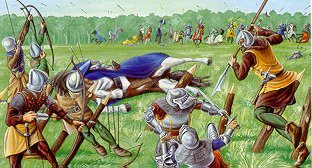Pluck Yew!
Here’s an interesting story that was recently emailed to me, I’m not sure of it’s origin.
 Well, now……here’s something I never knew before, and now that I know it, I feel compelled to send it on to my more intelligent friends in the hope that they too, will feel edified. Isn’t history more fun when you know something about it?
Well, now……here’s something I never knew before, and now that I know it, I feel compelled to send it on to my more intelligent friends in the hope that they too, will feel edified. Isn’t history more fun when you know something about it?
Before the Battle of Agincourt in 1415, the French, anticipating victory over the English, proposed to cut off the middle finger of all captured English
soldiers. Without the middle finger it would be impossible to draw the renowned English longbow and therefore they would be incapable of fighting in the future. This famous English longbow was made of the native English Yew tree, and the act
of drawing the longbow was known as “plucking the yew” (or “pluck yew”).
Much to the bewilderment of the French, the English won a major upset and began
mocking the French by waving their middle fingers at the defeat French,
saying, See, we can still pluck yew!
Since ‘pluck yew’ is rather difficult to say, the difficult consonant cluster at
the beginning has gradually changed to libidinal fricative F’, and thus the
words often used in conjunction with the one-finger-salute!
It is also because of the pheasant feathers on the arrows used with the longbow
that the symbolic gesture is known as “giving the bird.”
And yew thought yew knew every plucking thing.

That is essentially the accepted “story” except that it has been Americanized. First of all the English do not use a single finger salute, the English use two, the index and middle fingers, usually in an upthrust gesture and often accompanied by a resounding “razzberry.”
As for the single finger salute, it far predates the Hundred Years war. One report notes: “The middle-finger gesture, which has apparently had phallic connotations in every culture in which it has been used, is much older. We know it dates back to ancient Greece, at least, where it was referenced in “The Clouds,” a play written by Aristophanes in 423 B.C. It was also well known to the Romans, who referred to it variously as digitus infamis (“infamous finger”) and digitus impudicus (“indecent finger”). In all likelihood its origins were prehistoric.”
Another site traces the “pluck Yew” story’s first origins to the internet in 1996.
Still a good story though.